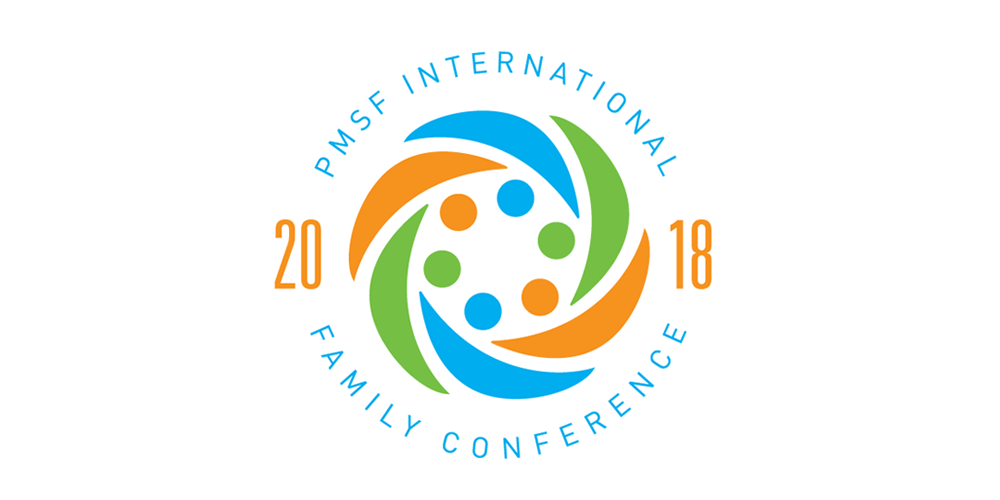Last month, I attended the Phelan-McDermid Syndrome Foundation (PMSF) 2018 International Family Conference in Dallas, Texas. I would like to thank Abby Lievense Lagunoff for inviting me to PMSF 2018 – I enjoyed getting to know the PMS community, and really appreciated PMS families’ willingness to share their experiences with me. I met families from all over the world – from a family who lives a mile from my home to families from Australia and France. It was a truly international meeting!
Genetics of Phelan-McDermid Syndrome
Phelan-McDermid Syndrome is a rare genetic disease with a broad range and severity of symptoms, including neonatal hypotonia, absent or delayed speech, developmental delay, and minor dysmorphic features. Most mutations arise de novo (spontaneously) by the loss of the terminal end of chromosome 22 (22q13). This region contains many genes, including SHANK3, and the loss of SHANK3 gene function is sufficient to cause PMS.
 Idiogram of chromosome 22, position 13.33
Idiogram of chromosome 22, position 13.33
PMSF 2018 McPosium
The McPosium consisted of family-friendly research talks where each 20-minute talk was followed by a 20-minute table discussion and a 20-minute panel Q&A. The table discussions, which were divided into patient age groups, were quite productive. As a researcher, I had the rare opportunity to interact with patient families and hear their concerns. I’ll highlight a few of the McPosium talks that stood out to me:
Jimmy Holder, of the Baylor College of Medicine, spoke about the importance of addressing epilepsy in PMS, since it can lead to serious complications. In fact, long seizures can last over an hour, and are associated with increased mortality.
Nathan Call, Clinical Director of the Marcus Autism Center, discussed current treatments for problematic behaviors. These behaviors can arise as a means of communication, since some PMS patients are non-vocal. In contrast to non-verbal, non-vocal refers specifically to a lack of vocal speech. One way to offset problematic behaviors is to offer a different method of communication, such as note cards or other signaling cues. Call also discussed NIH-funded research into an accelerometer to track patient movements. This is still in the works, and machine learning is being used to distinguish acceptable from problematic behavior (a high-five versus a slap).
Joseph Buxbaum, of the Icahn School of Medicine at Mount Sinai, went over several ongoing clinical trials for PMS: IGF-1, oxytocin, and AMO-01 from AMO Pharma. AMO-01 targets the Ras-ERK pathway.
Lastly, Pilar Magoulas, of the Baylor College of Medicine, gave a fantastic introduction to Genetics with liberal use of metaphors. For example, she used THE CAT HAD RED FUR AND RUN FAR to show the 3-letter words of the genetic language, and how changes in any single letter can alter the sentence. From the discussion at my table, the families really appreciated the genetics lesson.
I had a lot of great discussions at my poster. Families and researchers alike were excited about Perlara’s multi-organism approach to drug discovery, and how it could be used to help PMS. I also spoke to a couple of PMS siblings who were interested in genetics, and pursuing a career that could help them find cures. They were some of the most motivated college students that I’ve met!
PMSF 2018 Research Symposium
One afternoon was dedicated to the Research Symposium, which was in the style of typical scientific meetings where talks are followed by short Q&A sessions. I was particularly interested in Jimmy Holder’s talk on posttranslational modifications of SHANK3. Many missense mutations in SHANK3 result in nonsense or frameshift, leading to loss-of-function mutations. However, there are a number of point mutations with unknown pathogenicity. SHANK3 has 41 sites that are known to be phosphorylated. Specifically, a mouse model of the human variant S686I leads to loss of phosphorylation and interaction with a binding partner, ABI1. This interaction is important for normal postsynaptic density and S686I mice show abnormal social behavior and impaired vocal communication. Missense mutations that alter just a single amino acid residue without causing premature termination are very interesting and from a drug screening perspective, offers a different way to rescue the protein compared to a truncated or absent protein. Therefore, it would be valuable to learn more about these pathogenic missense mutations in SHANK3.

United in Hope
The theme of the PMSF 2018 conference was “United in Hope”, and it aptly captured the mood of the families and researchers alike: united in hope, and united for a cure. I hope that at the next conference, in 2020, we’ll be discussing advances toward that goal!
Feature image & “Unite in Hope” image courtesy of the Phelan-McDemid Syndrome Foundation



